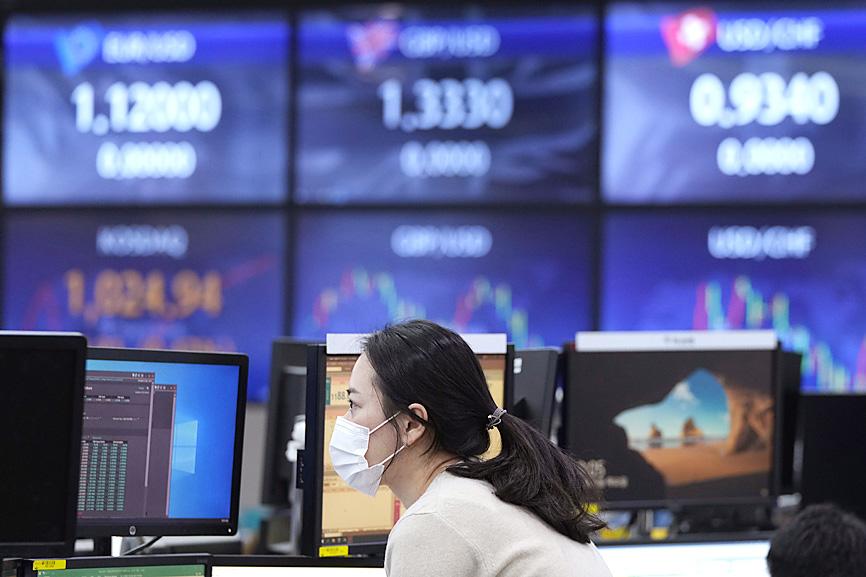Bank of Korea (BOK) Governor Lee Ju-yeol yesterday said interest rates are still accommodative after two hikes since August, suggesting further tightening is in the pipeline as inflation risks mount in the recovering economy.
The board considered the price pressures building in the economy and financial imbalances when it decided to raise rates by 25 basis points to 1 percent, Lee told a press briefing.
The central bank revised up its inflation outlook to 2.3 percent for this year and 2 percent for next year, expecting price gains would exceed, or at least hover around, its target through next year.

Photo: AP
It also forecast GDP unchanged at 4 percent growth for this year and 3 percent for next year.
“With this hike, the policy rate is still below the neutral level, the real rate is still negative, and there’s plenty of liquidity,” Lee said. “It’s natural that we normalize the rate, which has been excessively low, as the economy recovers.”
Bond yields fell and futures rose following the decision, as the governor failed to commit to a firm date for the next hike.
One of the central bank’s seven policy members dissented from the decision and called for rates to remain unchanged, largely in line with market expectations of the likely voting pattern.
“Concerns that this meeting will be a hawkish hike seems to have eased, as Lee said the timing of the next rate increase will depend on the economy and didn’t specify a timing,” Shinyoung Securities Co fixed-income strategist Cho Yong-gu said.
Central banks worldwide are grappling with price pressures that threaten to destabilize their economies’ recovery from the COVID-19 pandemic.
New Zealand on Wednesday signaled aggressive tightening ahead after hiking for the second time in two months, while surging US prices are pressuring the US Federal Reserve to pivot more quickly to tightening.
Lee referred to global supply bottlenecks and rising inflation expectations among the public as factors that could fuel further price gains in the economy.
The Fed’s policy moves will be an important consideration for the BOK, but domestic conditions will take priority, he said.
However, adding to uncertainty is South Korea’s COVID-19 situation: The number of daily cases reached a new record this month, as the government loosened restrictions.
In addition, while exports have so far benefited from a pandemic-era boom in tech demand, a normalization of that trend could see trade become less of a support to growth.
Lee now has two more decisions before he steps down in March next year.

Among the rows of vibrators, rubber torsos and leather harnesses at a Chinese sex toys exhibition in Shanghai this weekend, the beginnings of an artificial intelligence (AI)-driven shift in the industry quietly pulsed. China manufactures about 70 percent of the world’s sex toys, most of it the “hardware” on display at the fair — whether that be technicolor tentacled dildos or hyper-realistic personalized silicone dolls. Yet smart toys have been rising in popularity for some time. Many major European and US brands already offer tech-enhanced products that can enable long-distance love, monitor well-being and even bring people one step closer to

Malaysia’s leader yesterday announced plans to build a massive semiconductor design park, aiming to boost the Southeast Asian nation’s role in the global chip industry. A prominent player in the semiconductor industry for decades, Malaysia accounts for an estimated 13 percent of global back-end manufacturing, according to German tech giant Bosch. Now it wants to go beyond production and emerge as a chip design powerhouse too, Malaysian Prime Minister Anwar Ibrahim said. “I am pleased to announce the largest IC (integrated circuit) Design Park in Southeast Asia, that will house world-class anchor tenants and collaborate with global companies such as Arm [Holdings PLC],”

Thousands of parents in Singapore are furious after a Cordlife Group Ltd (康盛人生集團), a major operator of cord blood banks in Asia, irreparably damaged their children’s samples through improper handling, with some now pursuing legal action. The ongoing case, one of the worst to hit the largely untested industry, has renewed concerns over companies marketing themselves to anxious parents with mostly unproven assurances. This has implications across the region, given Cordlife’s operations in Hong Kong, Macau, Indonesia, the Philippines and India. The parents paid for years to have their infants’ cord blood stored, with the understanding that the stem cells they contained

Sales in the retail, and food and beverage sectors last month continued to rise, increasing 0.7 percent and 13.6 percent respectively from a year earlier, setting record highs for the month of March, the Ministry of Economic Affairs said yesterday. Sales in the wholesale sector also grew last month by 4.6 annually, mainly due to the business opportunities for emerging applications related to artificial intelligence (AI) and high-performance computing technologies, the ministry said in a report. The ministry forecast that retail, and food and beverage sales this month would retain their growth momentum as the former would benefit from Tomb Sweeping Day